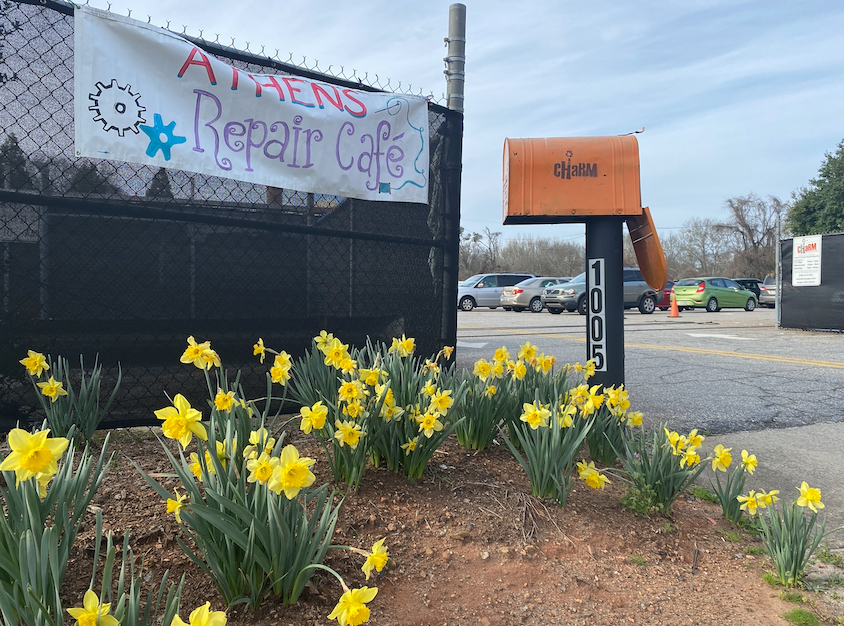
When Steven Armor’s retro-inspired space heater stopped blowing hot air, he immediately looked for a solution. The heater was only four or five months old, and still under warranty.
Armor, however, wasn’t happy with the way the manufacturer of the space heater handled warranty claims. In order to get a replacement, he’d have to destroy the current heater and send photographic evidence of the destruction. He said that felt wasteful, and his mind instead turned to a program he’d recently heard about.
“When [the heater] broke, it’s like the words ‘Athens Repair Café’ materialized in my head,” Armor said.
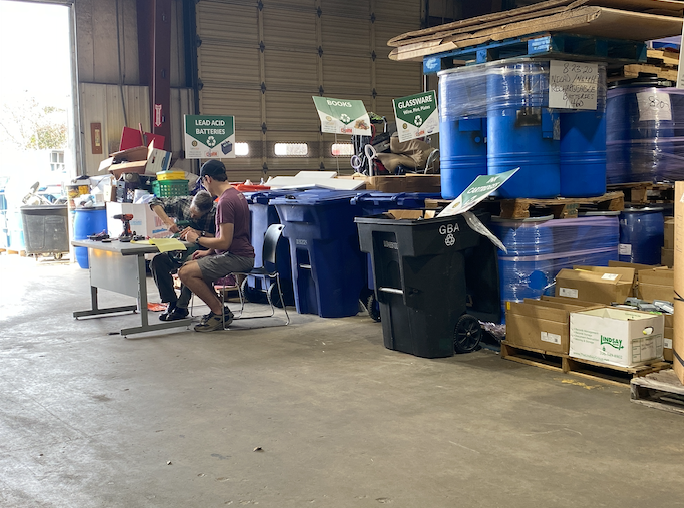
The initiative that miraculously appeared in Armor’s head is a place for Athenians to bring their broken items, like bicycles, clothing, electrical appliances and toys, to volunteers with the knowledge and skills needed to repair them.
The Athens Repair Café utilizes the reuse model to extend the life of items and prevent consumers from having to purchase replacements, which are the result of many environmentally damaging processes, like mining for fossil fuels, utilizing factories for production and emissions-releasing transportation. Furthermore, it diverts items from the landfill, where many of them would break down and release greenhouse gasses, which contribute to climate change.
Research from the United Nations shows that solid organic waste accounts for about 20% of methane emissions produced by humans. Methane is an incredibly potent greenhouse gas — about 80 times more than carbon dioxide — that holds heat in the atmosphere, which warms the climate over time.
Additionally, the United States Environmental Protection Agency found that 42% of greenhouse gases emitted in the United States were part of the creation and throwing away of products.
If countries move to reduce methane emissions and other greenhouse gas emissions by at least 40% by 2030, the world will be able to reach the goal of reducing global temperatures by 1.5° C, set forth by the Paris Climate Agreement.
Why It’s Newsworthy: With the looming climate emergency, Athenians have been utilizing a widely-implemented model to cut down on processes and habits that induce climate change and stop contributing to the growing problem, encouraging others in the community to do the same.Repair Café Comes to Athens
The Repair Café is held approximately once a month at the Center for Hard to Recycle Materials (CHaRM) in Athens by the Athens-Clarke County Recycling Division. Abigail West, reuse coordinator for the Athens-Clarke County Solid Waste Department, is in charge of facilitating the Cafés, which she has been doing for a little over a year since its relaunch following the coronavirus pandemic.
The concept of a program repairing broken items, however, has been around much longer than that. Some veteran Athenians may recognize the Café’s model under a different name: the FixIt Clinic, which began about eight years ago under Suki Janssen, solid waste department director.
West now utilizes the model of Repair Café International, an organization that began in Europe and now spreads the reuse model across the globe. The organization provides materials to get the Café off the ground, like signage.
“We really liked that model a lot better, because FixIt Clinic souds like something’s wrong and like you’re going to the doctor, and that’s not as inviting to people as the idea of a Repair Café,” West said.
The Athens Repair Café is one of 2,664 Repair Cafés worldwide registered under Repair Café International.
A Day at the Repair Café
When attendees arrive at the monthly Repair Café in the CHaRM, they are met with tables lining either side of the large warehouse. Volunteers occupy these tables, some ready to work on bicycles, others clothing and others general tinkerers willing to try their hand at whatever walks in the door.
After signing in with their name, contact information and type of items brought for repair, attendees are invited to grab a cup of coffee from Jittery Joe’s — a hallmark of the “café” vibe for West.
“Jittery Joe’s supports us by donating coffee and hot water for tea and stuff every month, so that helps create that inviting atmosphere,” West said.
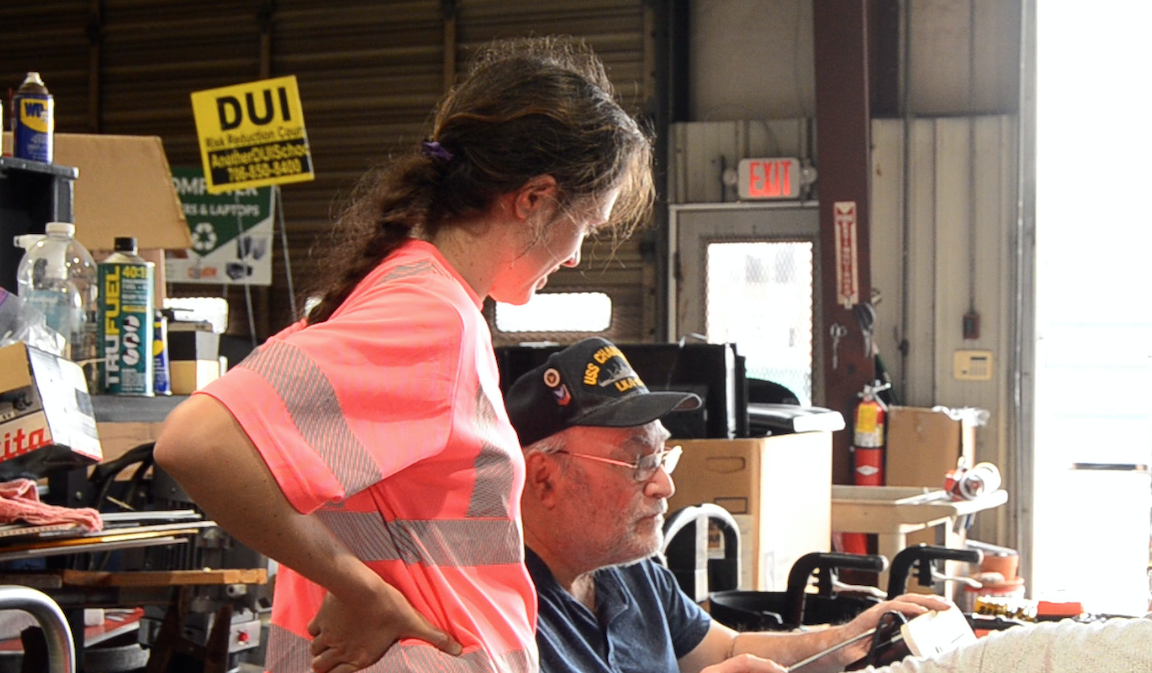
After signing in, attendees bring their items to the appropriate workstation and get to know the volunteer who will be working on their item.
Sloane Singson approached the table with sewing machines to get her clothing repaired at the February 2023 Athens Repair Café.
Singson has been trying to live a more sustainable lifestyle for the past few years. After hearing about the Café, she started collecting her clothing to bring in for repair.
“Most of my clothes I have are still from high school, so I try and get them fixed up,” Singson said.
As she was explaining to the volunteer the necessary repairs for each item, Singson reflected on why a sustainable lifestyle, including extending the life of her clothing through reuse, was important to her. After studying public health, she became more aware of climate change.
“Knowing all those facts, it’s kind of hard not to switch to a more sustainable living,” Singson said.
Caroline Solomon and Dan Pitts, volunteers at the Athens Repair Café, brought their sewing machines to repair clothing items for Athenians like Singson.
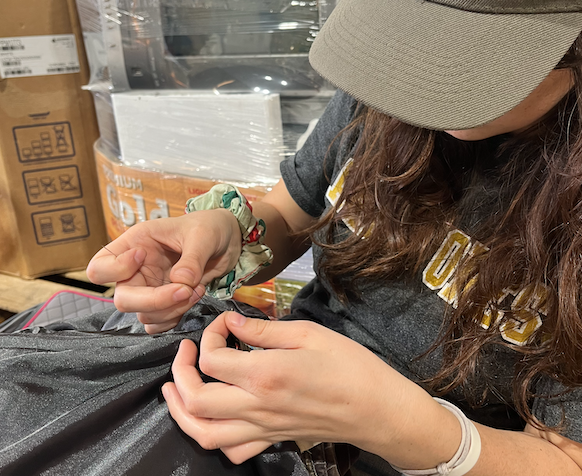
It was Pitts’ first time as a volunteer, and they came ready to help make repairs.
“I’m very interested in helping other people reuse things,” Pitts said. “People have been really happy about getting to continue to keep their clothes, and that’s great.”
While Solomon and Pitts tended to the textile needs of Athenians, Michael Brugger volunteered his time that Sunday as well. Though he normally repairs bicycles, he said he’d work with anything that he could.
Brugger said he believed in the philosophy of the reuse model to combat climate change, noting how fixing items prevents consumers from needing to buy new ones.
“If it doesn’t have to be built, or mined, or whatever … it’s definitely helping the environment,” Brugger said.
“And every time you have to make something, something gets destroyed, you know, you’re creating more pollution. If you can repair it, and give it a longer life, that’s better for the environment.”
After working with the items and getting to know the attendees, volunteers will return the item back to its owner. If the item is able to be fixed, this prevents the consumer from throwing that item into the landfill and prevents them from needing to purchase a replacement item.
The Evidence
At the February 2023 Athens Repair Café, all 21 items that were brought in by attendees were successfully repaired.
This high success rate is not always the case, however. The previous month saw 19 items successfully repaired, and four given a “partial repair,” according to data provided by West. In these partial repairs, the volunteer does as best they can to repair the item and then gives the attendee advice on how to pursue further repairs.
Over the past year that West has been in charge of the Café, 102 attendees have brought in about 100 items have been successfully repaired and 21 items have been partially repaired, according to data provided by West.
Although they don’t keep data on the number of months or years each items’ use has been extended, Janssen said each item that isn’t thrown away actively combats climate change.
“Anytime you can, you know, get one of something and hopefully that’ll last a long time, you’re preventing … additional mining and everything that surrounds that,” Janssen said.
Furthermore, the number of times the Café is held has grown. When it was known as the FixIt Clinic, the events would be held either quarterly or twice a year.
West pushed for the Cafés to occur more frequently. Now, with the exception of the summer break, the Repair Cafés are mostly held once a month.
“I think that the previous model of doing them quarterly at best was not effective for getting recognition in the community,” West said. “Now, more and more people are showing up because they’re like, ‘Oh, yeah, I heard about it a couple times.’”
Though West is thrilled with the number of items that have been diverted from landfills, she said that the real impact of the Athens Repair Café is one that probably can’t be laid out on a graph or chart.
What’s Working
-
The country rejecting throwaway culture
Paris hosts a dozen “repair cafes,” which are free, monthly events where residents can fix household objects and electronics with the help and advice of volunteers. The events usually have about 25 attendees who seek to limit the vast amounts of household waste, particularly E-waste, by repairing broken electronics and appliances. France’s National Assembly also introduced an index of “repairability” ratings for appliances such as washing machines, lawnmowers, televisions and smartphones, in hopes of increasing the percentage of electronics that are repaired rather than discarded.
Considering the perspectives of Armor, Singson and others who attended the Café, West said the qualitative impact on Athenians’ mindset about repairing their items and building community over it is probably more important than the sheer number of things that have been repaired.
It’s part of the reason they don’t weigh the items that are repaired, which is a common unit of measurement when evaluating waste and recycling.
“I really don’t think that this is a program that has an impact measured in a quantitative way like that, at least not right now,” West said. “I think there’s probably more impact that we can’t measure, just because people are hearing about it, and like thinking about it differently.”
She said the anecdotal evidence is what constantly opens her eyes to the impact the Athens Repair Café has.
“The best moments are … the individual stories. It’s like what somebody brings in and we’re able to fix,” West said.
Is the Athens Repair Café Even Effective?
In a culture in which consumers can toss broken items and replace them quickly, they are contributing to climate change by purchasing new items.
Jenna Jambeck, professor of environmental engineering at the University of Georgia, said that all items have a certain amount of embodied energy — a sum of energy it takes to create the item, including manufacture, transportation and other climate-destructive processes.
“If you think about all the energy, and materials, and the emissions associated with all of that work that went into that, just making that one item,” Jambeck said. “All of that work had to take place to … create that item. And so you are saving that when you reuse, continue to use it as long as you can.”
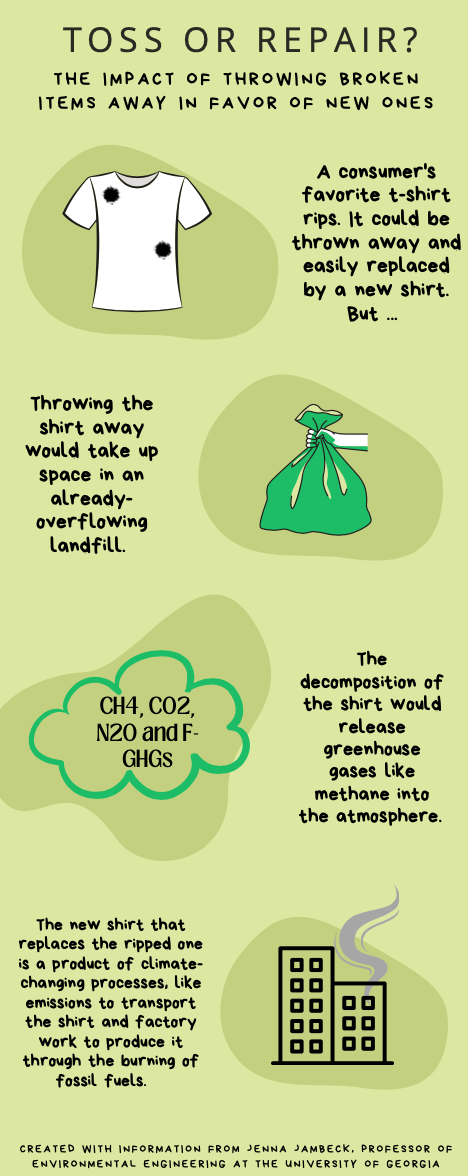
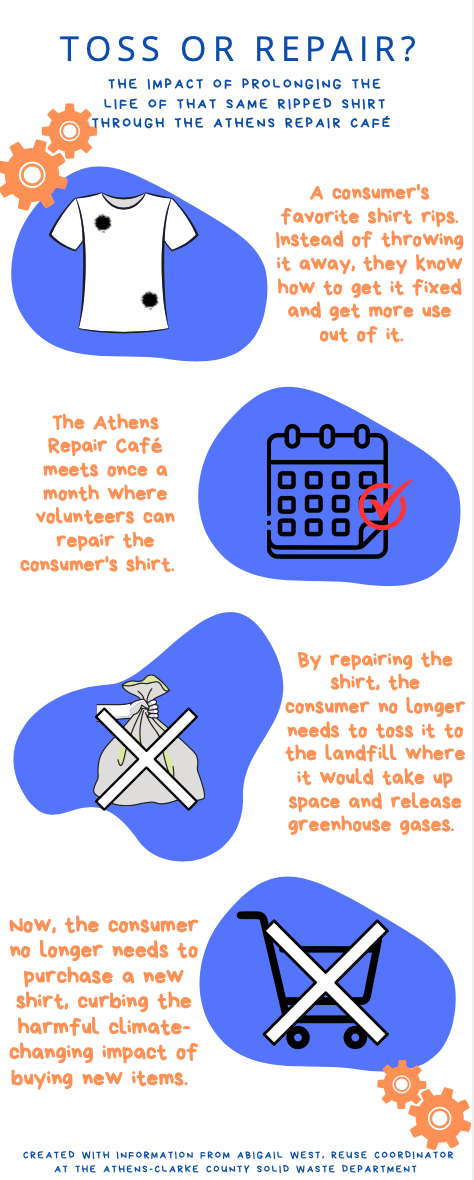
Though nearly 100 items may not sound like a large amount, especially when tackling the global problem of climate change, Jambeck evaluated the Athens Repair Café as a successful initiative.
“I think it’s a tremendous resource for the community and really can help avoid the impacts to the climate,” Jambeck said.
She said every item that is diverted from the landfill and not tossed out in favor of a new item is a success that chips away at the problem of climate change.
“I mean, that’s 100 items that we kept the energy, all of the energy and emissions that went into making those items was saved. And then we also avoided putting them in the landfill. So I think that does have an impact,” Jambeck said. “Really capturing that embodied energy is the highest thing that you can do … I’m actually surprised it’s that many.”
Jambeck was also hopeful about the potential for growth of the Athens Repair Café, particularly because of a more widely-accepted social norm of repairing items and keeping them.
“Obviously, it will only grow because [the Repair Café] will just continue to save items over time,” Jambeck said. “That change over time, more of an acceptance to like, ‘wow, not only can these things be repaired, we can get help to do it.’”
Limitations to the Solution
Sally Kirklewski brought her broken espresso machine to the February Athens Repair Café. She has attended the Café for repairs and also volunteered in previous months, and was hoping someone could fix the water pump.
“[The machine] was a hand-me-down from a family, so I’d love to get it back working if possible,” Kirklewski said.
Because she was short on time, however, Kirklewski was forced to leave without a repaired machine. She hoped that next month she’d have more time to wait.
Kirklewski’s experience highlights a limitation preventing the Athens Repair Café from taking the solution further: difficulty recruiting volunteers.
“My biggest challenge is finding fixers,” West said. “I’m very reliant on a couple of loyal volunteers, and I would like to be a little less reliant on expecting those folks to come down here every month … some [attendees] leave because they get impatient.”
Janssen said one possibility for the shortage of fixers is that some hands-on trades aren’t being practiced by younger generations.
“Some of these trades aren’t sought after like they used to be,” Janssen said.
West noted that another challenge she’s had to manage while running the Cafés is communications with the public. Despite running ads in local publications and advertising on Facebook, she said that it can sometimes be difficult to stay on top of the questions from the public, because she is the only person in charge of those duties.
“When you’re organizing events in general, it’s hard to get people to come to them,” West said.
West added that there is one noticeable group that isn’t benefitting from the Athens Repair Café.
“People who don’t know about it. Which is a lot of people. I think everybody could benefit from it,” West said.
Puneet Dwivedi, associate professor of sustainability sciences at the University of Georgia, agreed with West’s evaluation.
He said communication with the public is key to making this option more widespread.
“What we need to do is make sure that more people are aware of these repair options,” said Dwivedi.
He gives an example of his own experience in seeking options for repairs after his lawnmower broke. Dwivedi was able to fix the lawnmower himself, however, it took him an entire month to repair the machine.
“But if somebody is there who can tell me how to fix it, I will fix it and never have to buy a new one,” he said.
Is Replication Possible?
West said the Repair Café International organization is the best resource for people trying to replicate the program in their area. She said it was a crucial part to revitalizing the reuse model in Athens.
To her, it was worth the one-time fee for access to graphics, timeline and planning tools and other resources. She said it helps hosts stay on track for certain tasks that need to be completed by the day of the event.
“They really help answer all those questions for people,” West said.
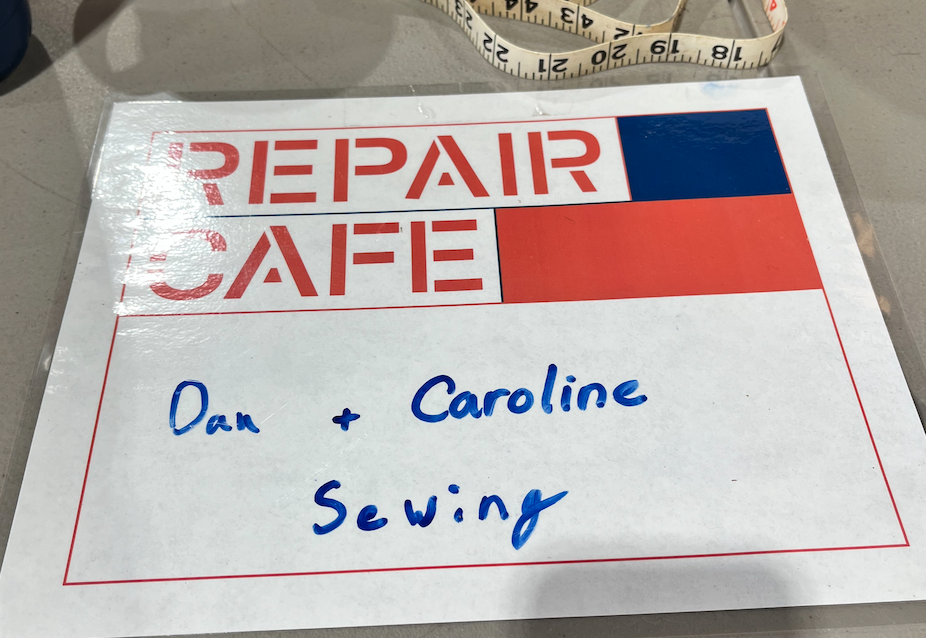
One thing Repair Café International doesn’t provide, however, is space to hold the Café. Since West has access to the CHaRM, that is where the Athens Repair Café is held, but she said having a meeting place is crucial to holding the event.
The Repair Movement and The Future
In thinking about inspiring a cultural shift through the Repair Café, West believes that such inspiration may not come simply for the sake of sustainable living, but sentimentality, as well.
“The repair aspect, I think, is a particularly good face of this movement,” West said. “Because you’re fixing things that people are passionate about … Maybe it’s a family heirloom even, or if it’s not that, it’s something that they’ve had for 20 years and it’s been through multiple chapters of their lives.”
For others, as is the case for Steven Armor, the push toward sustainability may neither be on principle alone nor for sentimentality, but for the hope of a cleaner, healthier future, a cause that became more personal last November after the birth of his child.
“Landfill diversion is something that’s important to me and my family,” Armor said. “I’m a new father, so I want to leave a better world for [my son], a cleaner world.”
Anna Chapman, Clara Kiker, Malcolm Montgomery and Justin Morris are journalism students at the University of Georgia.



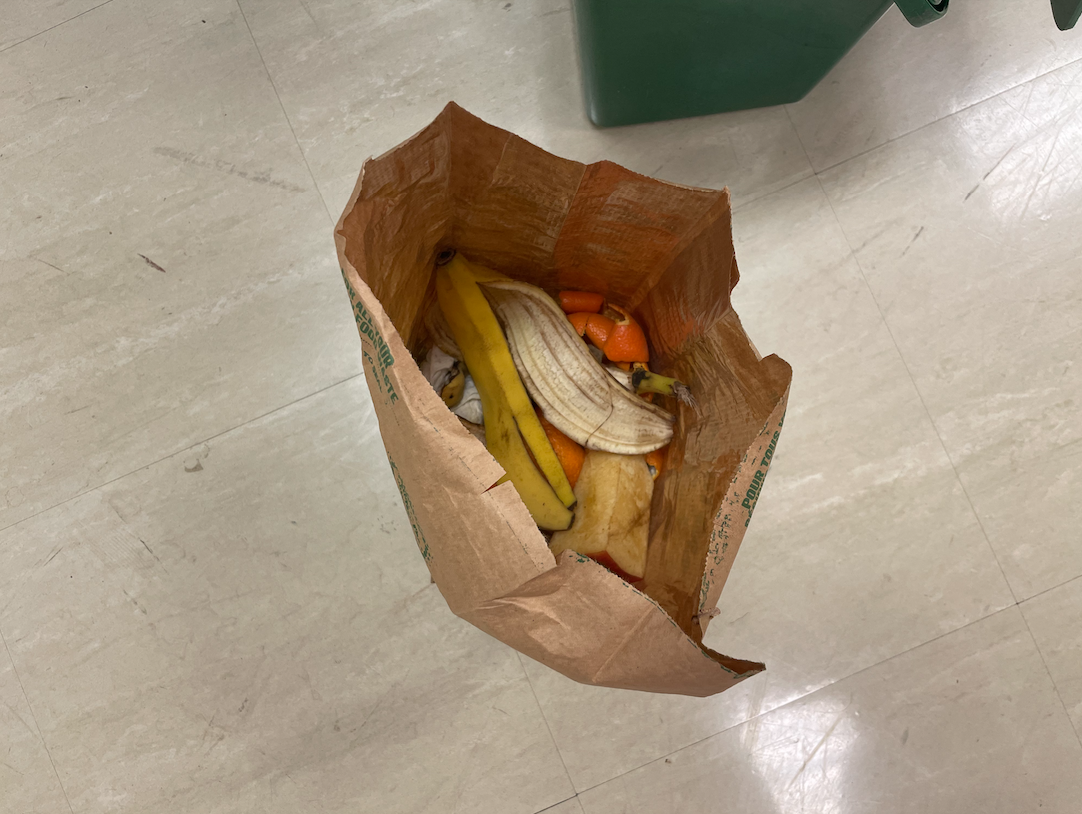
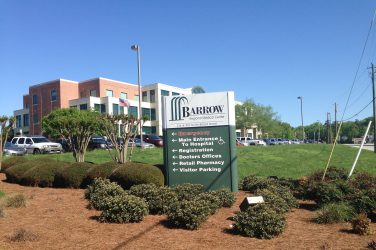
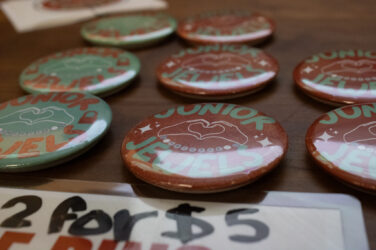
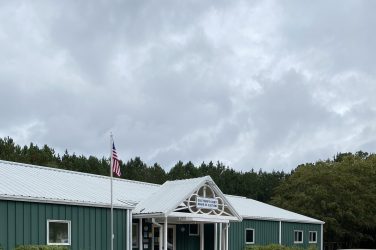

Show Comments (0)